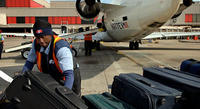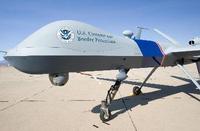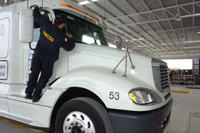-
Report recommends abolishing fees for checked bags

A recent report by the U.S. Travel Association (USTA) found that airlines’ policy of charging for checked bags cost DHS additional money, increased wait times at airport checkpoints, and discouraged people from flying; the airport check-in fee and the additional hassles of flying have discouraged people from taking two to three trips a year resulting in the loss of roughly $85 billion in potential consumer spending; the report suggested that the Department of Transportation issue regulations that required airlines to allow passengers one checked bag at no additional charge; it also recommended the implementation of a trusted traveler program
-
-
Corruption in academic accreditation
Little-known colleges, most unaccredited, exploit Byzantine federal regulations, enrolling almost exclusively foreign students and charging them upward of $3,000 for a chance to work legally in the United States; they flourish in California and Virginia, where regulations are lax, and many of their practices are shoddy — for instance, holding some classes on only three weekends per semester; these colleges usher in thousands of foreign students and generate millions of dollars in profits because they have the power, bestowed by the U.S. government, to help students get visas
-
-
Sector Report for Thursday, 24 March 2011: Border / Immigration control
This report contains the following stories.
Plus 1 additional story.
-
-
U.S. works closely with Mexico to curb power of cartels
The United States is already involved in the spiraling violence which threatens to make Mexico into a failed state: hundreds of thousands of U.S.-made firearms are bought at U.S. gun shows and then smuggled into Mexico to arm the cartels; but there is another aspect to U.S. involvement: more and more American agents are operating in Mexico to stem the flow off drugs into the United States and curb the power of the cartels; U.S. agents generally provide intelligence and training, while Mexicans do the hands-on work; neither side will say exactly how many agents are in Mexico, citing security concerns
-
-
Congress plans to use credit rating to verify American workers
The federal government is exploring the possibility of using a credit rating giant like Equifax to verify the identity of American workers, a move that could make it far more difficult for undocumented immigrants to get work using stolen Social Security numbers
-
-
Border agent seizes student's laptop without warrant
On 1 May when a U.S. Customs and Border Protection agent stopped Pascal Abidor, an Islamic studies doctoral student at McGill University in Montreal, at Champlain, New York’s port of entry; the agent turned on Abidor’s computer and found a picture of a rally by the Hamas militant group, something he had downloaded from the Internet for schoolwork; Abidor’s life has not been the same since
-
-
Border agents intercept "destructive" Pakistani insects in Oakland
The Khapra beetle, which is native to India, can eat its way through up to 70 percent of grain stores to which it has access; it was eradicated in the United States in 1966, and has been subject to federal quarantine since then; U.S. border agents in the Port of Oakland discover — and destroy — the larva in a shipment from Pakistan
-
-
Mark Krikorian, executive director of the Center for Immigration Studies
Mark Krikorian, the executive director of the Center for Immigration Studies, was interviewed by Homeland Security NewsWire’s executive editor, Eugene Chow; Krikorian discusses the Obama administration’s immigration strategy, why mass migration is an outdated phenomenon, and what the government can do to enforce immigration laws effectively; “make E-Verify mandatory,” he says
-
-
DHS probes dancers for visas
It was a close call for the East Village theater La MaMa: At least three weeks’ worth of box-office revenue was on the line when DHS questioned the visa applications submitted by artists in an upcoming performance; although delayed by one week, the show will go on: The Irish Modern Dance Theatre’s “Fall and Recover,” a dance work inspired by survivors of torture, now opens Friday 25 March
-
-
E-Verify Self Check launched
DHS and U.S. Citizenship and Immigration Services (USCIS) announced the launch of E-Verify Self Check — a service that allows individuals in the United States to check their own employment eligibility status before formally seeking employment
-
-
Canada blasts DHS plan to impose a $5.50 border fee on Canadians
A $5.50 border fee proposed for the 2012 budget would net millions for the American coffers, funding security measures; DHS is calling for the change, and analysts predict the increase in collections could bring in up to $110 million dollars; Canadian Foreign Affairs officials have blasted the fee
-
-
U.S. UAVs track drug gangs in Mexico

The war in Mexico — between the drug cartels and the government, and among the drug cartels themselves — has been increasingly spilling across the border into the United States; some cartels now maintain outposts in the Arizona desert; to gather more information about the cartels, and to help the Mexican authorities in their war against them, the United States has been flying unarmed surveillance UAVs over Mexico; the flights are made in coordination with and at the request of the Mexican government; the Mexican authorities also choose the target of drone surveillance; drones had gathered intelligence that led to the arrest in Mexico of several suspects in connection with the murder of a U.S. immigration agent, Jaime Zapata
-
-
Monitoring Mexican trucks operating in the U.S.

The U.S. plan to equip Mexican trucks with electronic recorders for driver logs would be a limited, temporary program undertaken because it is the only way the Federal Motor Carrier Safety Administration (FCMSA) can ensure that the Mexican trucks will be monitored, the U.S. government says; under (NAFTA), the United States cannot require Mexican carriers to do anything that U.S. carriers are not required to do, but the government still must provide a way to monitor Mexican carriers for compliance with both the hours of service rules and the cabotage rules that restrict freight hauling between points in the United States
-
-
Auditor faults SBInet's successor
A federal auditor has found that DHS has not provided evidence that their plan to integrate surveillance technologies across the nation’s southern border will be more practical and cost-efficient than the failed $1.5 billion virtual fence the project is supposed to replace; GAO as well as security and technology experts, say the substitute plan closely resembles the original project that wasted hundreds of millions of dollars and years of work on tools that malfunctioned in the severe heat
-
-
Sector Report for Thursday, 10 March 2011: Border / Immigration control
This report contains the following stories.
Plus 1 additional story.
-
More headlines
The long view
Social Acceptance of Immigrants Working as Politicians or Judges Is Low
Often, the dominant society develops negative attitudes towards immigrants and their descendants because their integration is too successful – and not because they are unwilling to integrate. A possible explanation for negative attitudes towards successful immigrants could be the dominant society’s fear of immigrants occupying influential and value-based occupations. This applies, for example, for immigrants working in local politics or law.
